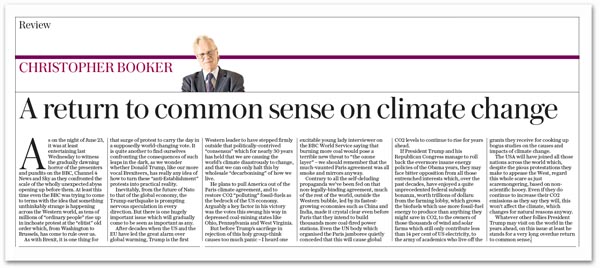I didn't watch the coverage on the US presidential election. But one of those who did was Booker. And, as on the night of June 23,
he writes, it was at least entertaining to witness the gradually dawning horror of the presenters and pundits on the BBC, Channel 4 News and Sky as they confronted the scale of the wholly unexpected abyss opening up before them.
But this time, even the BBC was trying to come to terms with the idea that something unthinkably strange is happening across the Western world. Tens of millions of "ordinary people" were rising up in inchoate protest at the "elitist" old order which, from Washington to Brussels, has come to rule over us.
The trouble is that, as with Brexit, it is one thing for that surge of protest to carry the day in a supposedly world-changing vote. It is quite another to find ourselves confronting the consequences of such leaps in the dark. We thus wonder whether Donald Trump, like our more vocal Brexiteers, has really any idea of how to turn these "anti-Establishment" protests into practical reality.
Inevitably, from the future of Nato to that of the global economy, the Trump earthquake is prompting nervous speculation in every direction. But, says Booker, there is one hugely important issue which will gradually come to be seen as important as any.
After decades when the US and the EU have led the great alarm over global warming, Trump is the first Western leader to have
stepped firmly outside that politically-contrived "consensus" which for nearly 30 years has held that we are causing the world's climate disastrously to change, and that we can only halt this by wholesale "decarbonising" of how we live.
He plans to pull America out of the Paris climate agreement, and to restore CO2 "polluting" fossil-fuels as the bedrock of the US economy. Arguably a key factor in his victory was the votes this swung his way in depressed coal-mining states like Ohio, Pennsylvania and West Virginia.
But before Trump's sacrilege in rejection of this holy group-think causes too much panic â I heard one excitable young lady interviewer on the BBC World Service saying that burning more coal would pose a terrible new threat to "the ozone layer" â we should remember that the much-vaunted Paris agreement was all smoke and mirrors anyway.
Contrary to all the self-deluding propaganda we've been fed on that non-legally-binding agreement, much of the rest of the world, outside the Western bubble, led by its fastest-growing economies such as China and India, made it crystal clear even before Paris that they intend to build thousands more coal-fired power stations. Even the UN body which organised the Paris jamboree quietly conceded that this will cause global CO2 levels to continue to rise for years ahead.
If President Trump and his Republican Congress manage to roll back the evermore insane energy policies of the Obama years, they may face bitter opposition from all those entrenched interests.
Over the past decades, they have enjoyed a quite unprecedented federal subsidy bonanza, worth trillions of dollars. At one extreme, there is the farming lobby, which grows the biofuels which use more fossil-fuel energy to produce than anything they might save in CO2.
At the other, there are the owners of those thousands of wind and solar farms which still only contribute less than 14 percent of US electricity. And then there is that army of academics who live off the grants they receive for cooking up bogus studies on the causes and impacts of climate change.
So, Booker concludes, the USA will have joined all those nations across the world which, despite the pious protestations they make to appease the West, regard this whole scare as just scaremongering, based on non-scientific hooey. Even if they do continue to increase their CO2 emissions as they say they will, this won't affect the climate, which changes for natural reasons anyway.
Whatever other follies President Trump may visit on the world in the years ahead, on this issue at least he stands for a very long overdue return to common sense.
What Booker doesn't discuss, though, having run out of space, is the possible impact on British politics. Although we are poised to leave the EU, the British Government is still nominally a fully signed-up member of the global climate change consensus, with commitments in this policy area which extend way beyond that required by EU law.
Thus, amongst other things, this issue is going to test the "double coffin-lid" structure of governance, where we get rid of the "inner lid" only to find global rules stand between us and liberation.
I drew this analogy in Flexcit, comparing Britain with the victim in a horror movie, trapped alive in an as-yet-unburied coffin. Having broken through the lid in a bid to escape, he finds to his consternation that there is another lid over the first.
This "double lid" effect will test the expectations of many a Brexiteer but, in the case of climate change, it will also test the relative pulls of "Europe" and the United States. Assuming that Trump lasts beyond the first term, the UK will have a clear choice between its climate-obsessed neighbours and its transatlantic allies.
That, probably, will be the true test of Brexit. Either way there will be a stretch of water to cross. That will either be the Channel or the Atlantic. It's unlikely that it can be both.
